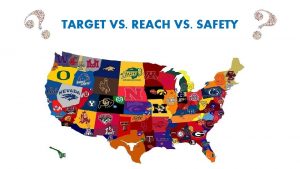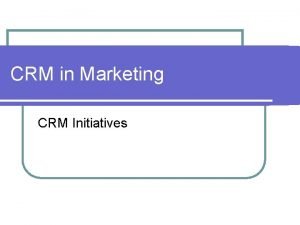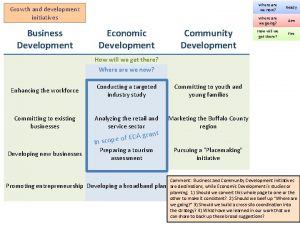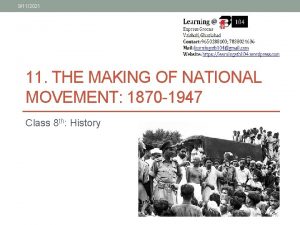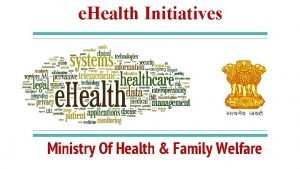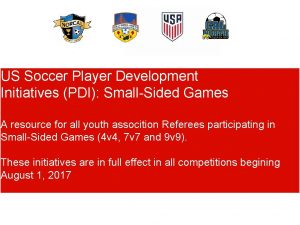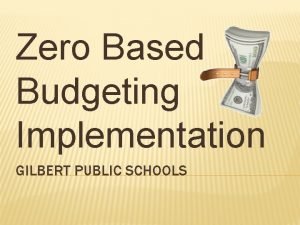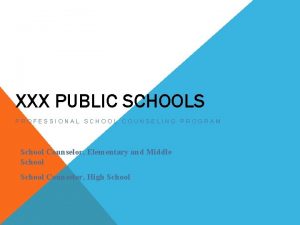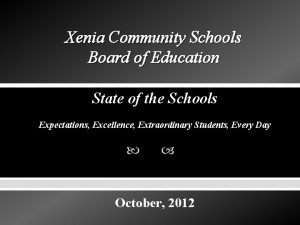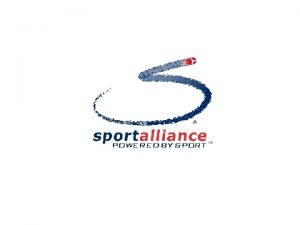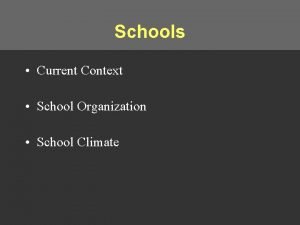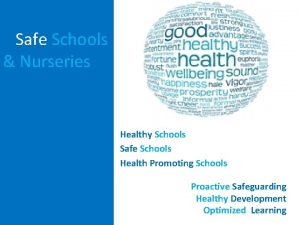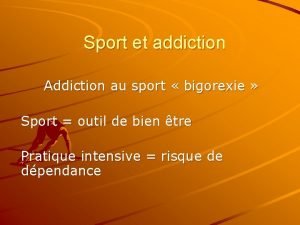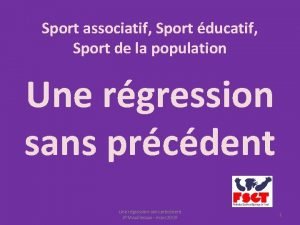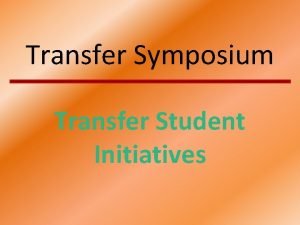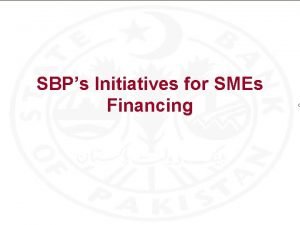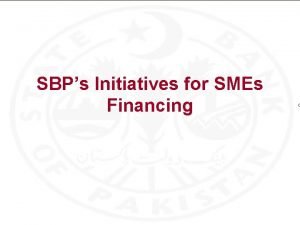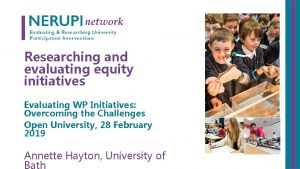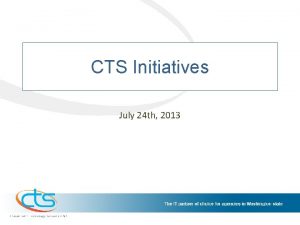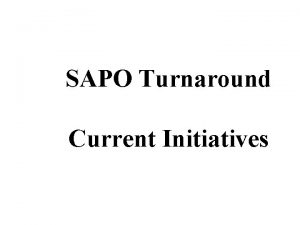Sport in Schools Initiatives in School Sport Sport


























- Slides: 26

Sport in Schools Initiatives in School Sport

Sport in Schools Some current initiatives and strategies in school sport • The PESSCL Strategy • This is Physical Education, School Sport and Club Links • This is delivered in 8 different strands. • TOPSPORT • This is a joint venture between Sport England the Youth Sports Trust • Part of the Active Schools programme

Sport in Schools The PESSCL Strategy • Launched April, 2003. • £ 459 m is being injected. • Aimed at promoting the delivery of high quality PE & school sport. • Overall objective is “to increase the percentage of 516 year olds who spend a minimum of 2 hours a week on high quality PE & school sport” (DCMS, 2004)

Sport in Schools How is the PESSCL Strategy being delivered? • Through 8 different strands: • Professional Development • QCA (Qualifications and Curriculum Authority) & School Sport Investigation • Gifted & Talented • Step into Sport • Swimming • Club Links • Sports Colleges • School Sport Partnerships

Sport in Schools Professional Development £ 18 m programme, enabling schools to draw from a range of free resources such as videos, workshops, mentoring and training programmes. Gifted & Talented Aimed at recognising & developing young people with sporting talent. Junior Athlete Education (JAE) programme set up to support young athletes. Sports Colleges involved in staging Academies to improve fundamental skills of talented 9 -12 year olds. QCA & School Sport Investigation QCA is working with schools to identify & promote best practice. An increase in results, attendance & progress in PE has been noted. Step into Sport Aimed at getting young people involved in both leadership & volunteering roles in sport. The programme liaises with LEA’s, NGB’s and sports partnerships.

Sport in Schools Swimming Aimed at promoting and improving the delivery of swimming in schools. The scheme advises LEA’s on how to deliver swimming lessons effectively and how to get more children involved. Club Links By 2006, the government hopes to have 20% of 5 -16 year olds involved in club sport on a regular basis. Links between schools & clubs are being fostered in order to promote this scheme. Sports Colleges Schools which will receive increased funding for improving facilities & provision of high quality sports to children. These schools will act both as symbols of sporting excellence, and as much needed community facilities. School Sport Partnerships Families of schools which will receive extra funding to improve and increase sports opportunities for all.

Sport in Schools What’s happening in schools? • The PESSCL strategy also aims to improve the amount of high quality sports teaching students receive in schools. • By doing this, schools become the ‘starter blocks’ for talent development. • They also become responsible for recognising ability within students and thus encouraging and motivating them in the necessary direction.

Sport in Schools How are links between schools and clubs being made? • In an attempt to improve Britain’s sporting prowess on the international field, the government hopes to improve on the number of young athletes who become affiliated to clubs. • By fostering links between schools & clubs through the SSCo partnerships (School Sport Co-ordinator), children are more likely to know about which sporting opportunities in clubs are available to them.

Sport in Schools How will this help to develop talented athletes? • Students will receive more quality coaching on top of their school hours of PE and School Sport. • This means they are more likely to develop their skills in their chosen sport. • Equally, young athletes are more likely to be picked up by the relevant development squads in order to progress to elite status.

Sport in Schools The 4 main strands of the National Junior Sports Programme • Top Play – for 4 -9 year olds. Used as an introduction to basic movement skills. • Top Sport – for 7 -11 year olds. Aims to develop sport specific skills. • Champion Coaching – for talented performers within their own regions. • Top Club – for 11 years and over. Performers are encouraged to specialise in specific sports/activities.

Policy, Provision & Administration of Sport & the Pursuit of Excellence Sport England • Major party in the delivery of the Government’s sporting objectives. • Also acts as a distributor of Lottery & Exchequer funds to sport. • Main mission is to make England successful and active as a sporting nation. • Sport England has invested £ 2 bn into sports in England since 1994.

Policy, Provision & Administration of Sport & the Pursuit of Excellence Sport England’s primary scheme • Start • Get people involved in sport in order to improve the health of the nation. • This is particularly relevant to disadvantaged & under-represented groups. • Stay • To ensure people remain in sport. • This area also includes getting new coaches and volunteers involved & staying involved in sport. • Succeed • To improve the English infrastructure of elite development. • Sport England hopes to improve England’s success on the world medal stage through this scheme.

Policy, Provision & Administration of Sport & the Pursuit of Excellence Sportscoach. UK • Established in Leeds, in 1983. • Aim to increase and improve the level of coaching in the UK. • Works with Sports Councils across the country, NGBS, schools, FE & HE institutions, Awarding Bodies and many more. • Provides a central resource of strategic & technical expertise, advice & support. • Works with funding agencies to integrate coaching development into local authorities and sports agencies.

Policy, Provision & Administration of Sport & the Pursuit of Excellence National Governing Bodies - NGB’s • Each sport has its own NGB which co-ordinates rules, competitions and officials. • NGB’s must generate their own funding through advertising, sponsorship, affiliation fees, donations and home county sports councils (Sport England etc). • NGB’s are also responsible for developing and promoting their sport at local and elite levels. • This done via increased access, improved coaching and enhanced facilities.

Policy, Provision & Administration of Sport & the Pursuit of Excellence The progression from local levels to elite performance in sport National Training squads National Squad Financial Assistance Progression To Area levels District Competitions Access to District/ County levels Talent scouts, club coaching Links to local clubs Early Activity In Schools Training at National Sports Centres Development squads Training Affiliation to NGB’s

Policy, Provision & Administration of Sport & the Pursuit of Excellence English Institute of Sport • Nationwide network of world-class support services aimed at developing the talents of elite athletes. • Funded via the Sport England Lottery fund. • Nine regional centres of excellence. • Services provided include sports medicine, physiology, biomechanics, psychology, training & coaching assistance and many more. • There is also a Performance Lifestyle programme providing career & education advice. • EIS currently has over 2000 athletes on it’s system. • One of EIS’s current schemes is to involve more coaches at local levels. Through this, EIS hopes to ensure the development of more talented young performers.

Policy, Provision & Administration of Sport & the Pursuit of Excellence TASS Talented Athlete Sponsorship Scheme Government funded programme. Represents links between sport and HE/FE. Hopes to develop sporting talent and success in the 16 -25 year old range. • Successful applicants for TASS scholarships will receive between £ 1000 and £ 3000 to assist with coaching and equipment costs, as well as educational expenses. • TASS athletes also receive a package of core sporting services. • These include coaching, sports medicine, sports science, strength & conditioning training and lifestyle management. • •

Policy, Provision & Administration of Sport & the Pursuit of Excellence National Lottery Funding for elite athletes • Launched in 1994. • Provided funding for 1000 community sports projects in its first year. • Distributed by Sport England. • Provides funding for facilities and support at local, regional and national levels. • The funding is available for communities or single individuals.

Policy, Provision & Administration of Sport & the Pursuit of Excellence Sports Aid • Aims to help talented young athletes via support from individuals, corporate partners and grant-giving trusts. • Funding takes two forms: • Sports Aid Grant – usually given to 12 -16 year olds in the form of direct financial help. • TASS – scholarship project.

Policy, Provision & Administration of Sport & the Pursuit of Excellence How does Sports Aid award grants? • NGB’s must nominate athletes with the highest potential for success. • Priority is given to athletes with the • These grants make huge differences for talented individuals who have the ability to succeed in their chosen sport but cannot afford coaching/travel/equipment etc.

Policy, Provision & Administration of Sport & the Pursuit of Excellence How effective are Government policies for elite talent development? • Local governments are responsible for provision of opportunity & provision for sport – even though it is the central government which decides upon what is to be done. • Thus, there are differing amounts of provision in different areas. • Equally, funding may differ from region to region. • However, cohesion does occur amongst NGB’s and sports organisations to promote and develop sport within the UK.

Policy, Provision & Administration of Sport & the Pursuit of Excellence How are provisions made available to individual performers? • Open days/’Come-and-try’ events. • NGB/Sports Council events to promote mass participation in specific sports. • Specific sports centres made available to all. • School facilities open to the community at specific times. • Facilities let to clubs/NGBs/voluntary organisations for coaching/competitive purposes. • Activity services run by local authorities staff for young athletes.

Policy, Provision & Administration of Sport & the Pursuit of Excellence Why might an athlete not make full use of the facilities and services made available to them? • Time • Money • Facilities

Policy, Provision & Administration of Sport & the Pursuit of Excellence Expected to train in free time Professional sport often requires athletes to train on a full-time basis NGB’s realising more training time is needed Schools of Excellence & some universities allow time for training Not enough training time to reach elite status Employers becoming aware of need for athletic employees to train

Policy, Provision & Administration of Sport & the Pursuit of Excellence High subscription fees – particularly for low profile/ female sports Funding is difficult to obtain for some athletes Funding not enough for some athletes’ expenses Imbalance between private & public sector funding Lottery funding has increased – but is unevenly distributed Sponsorship more readily available for athletes Local Government provides funding for sports provision

Policy, Provision & Administration of Sport & the Pursuit of Excellence Not enough facilities for some sports Some facilities too far away Private sector facilities require membership fees Large increase in number of facilities Dual/joint use provision of facilities Attempts being made to provide facilities to minority and traditional sports
 Powerschool login huntsville city schools
Powerschool login huntsville city schools Safety target reach schools
Safety target reach schools Delvic sanitation initiatives
Delvic sanitation initiatives Digital initiatives in higher education
Digital initiatives in higher education Crm marketing initiatives
Crm marketing initiatives Empathy and establishing trust with individuals
Empathy and establishing trust with individuals Business development initiatives
Business development initiatives People's initiatives
People's initiatives Nasa access management system (nams)
Nasa access management system (nams) Health initiatives
Health initiatives Service desk improvement initiatives
Service desk improvement initiatives Us soccer pdi
Us soccer pdi Global health initiatives meaning
Global health initiatives meaning Work life balance initiatives
Work life balance initiatives Faa strategic initiatives
Faa strategic initiatives Oakland affordable housing preservation initiatives
Oakland affordable housing preservation initiatives Health promotion initiatives pdhpe
Health promotion initiatives pdhpe Agency for strategic initiatives
Agency for strategic initiatives American academy of allergy asthma and immunology 2018
American academy of allergy asthma and immunology 2018 Japanese male school uniforms
Japanese male school uniforms Zhuhai international school
Zhuhai international school Gilbert public schools special education
Gilbert public schools special education Xxx
Xxx Xenia community schools
Xenia community schools Roles of a speaker in school
Roles of a speaker in school What was victorian school like
What was victorian school like Maths textbooks for primary schools
Maths textbooks for primary schools

